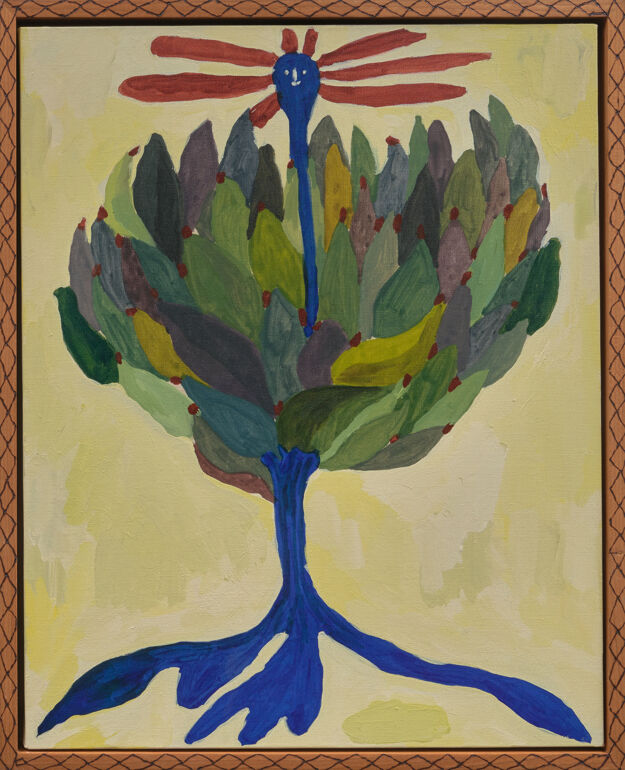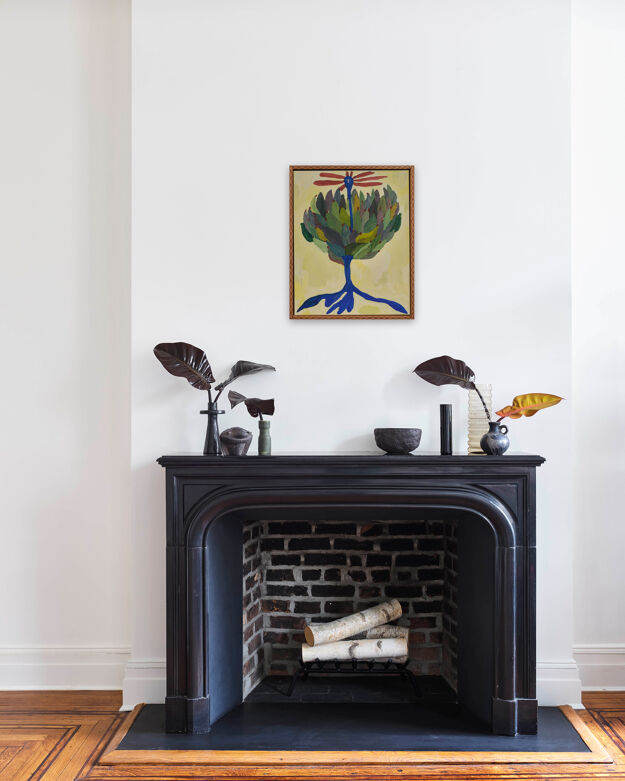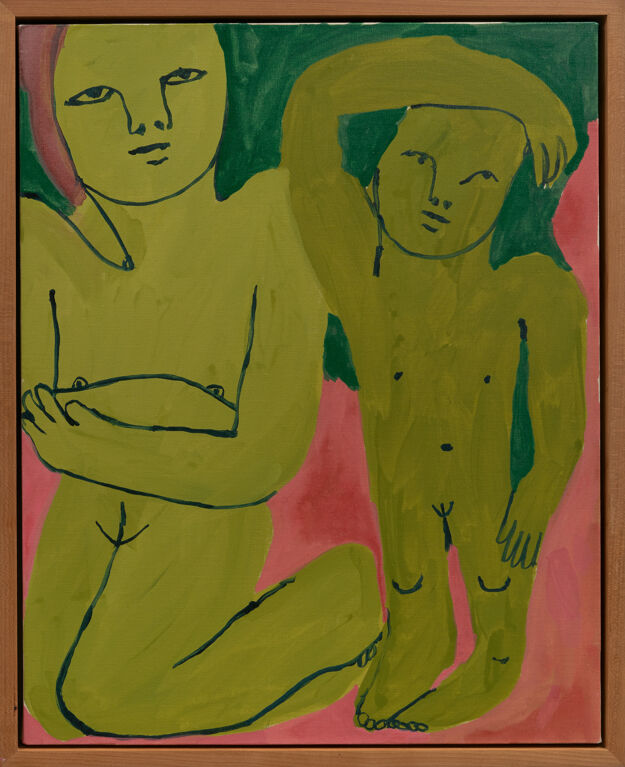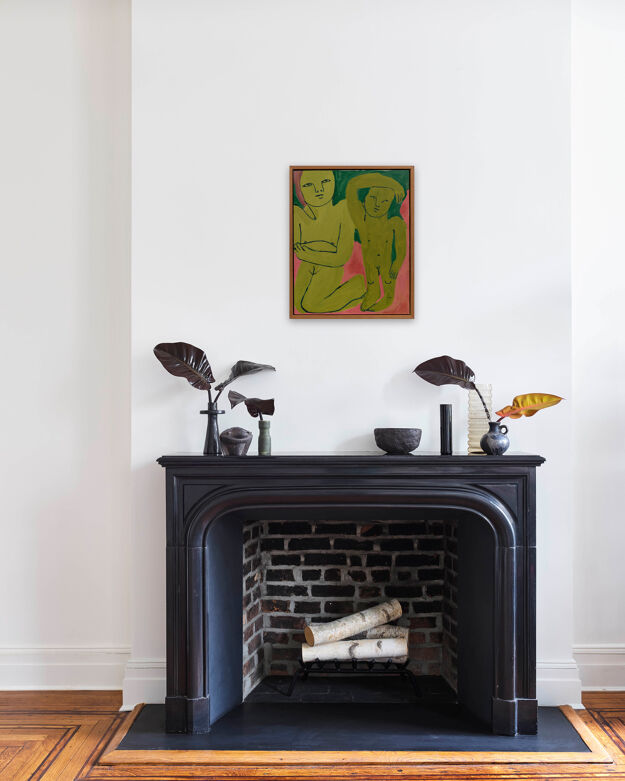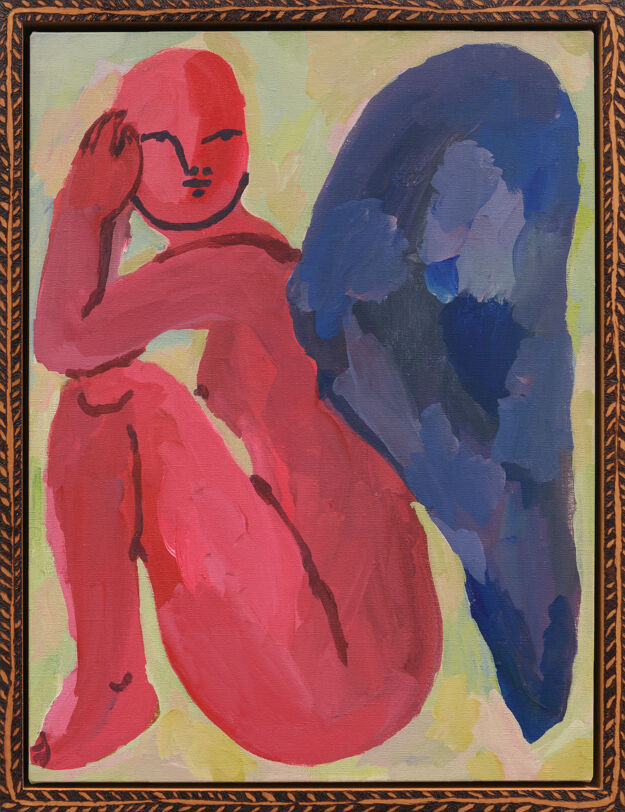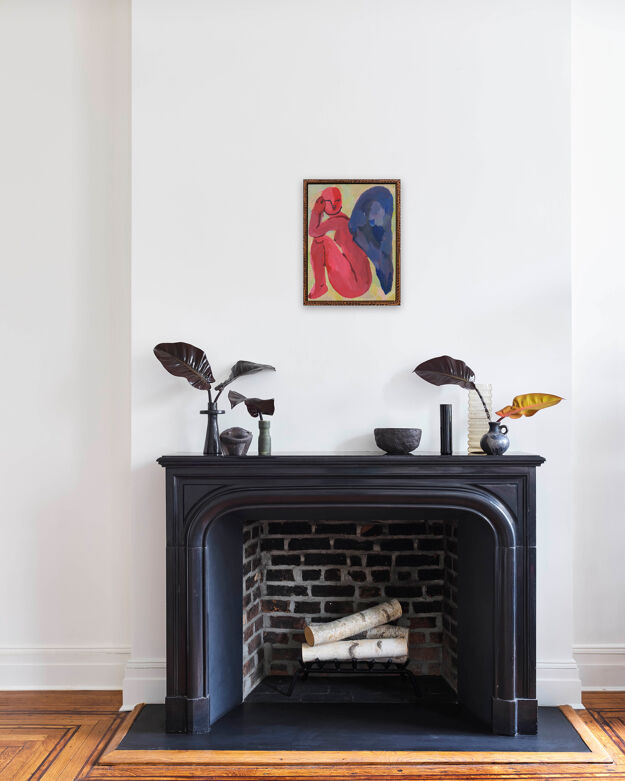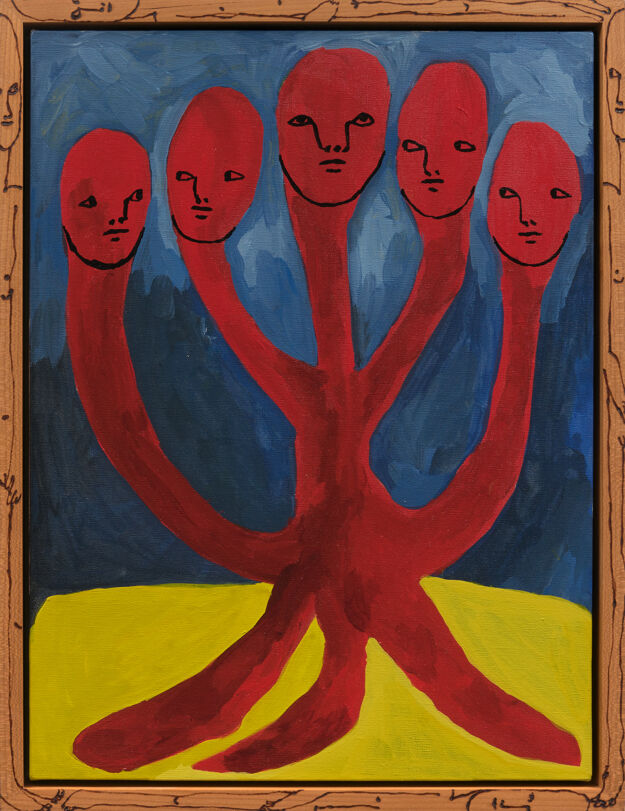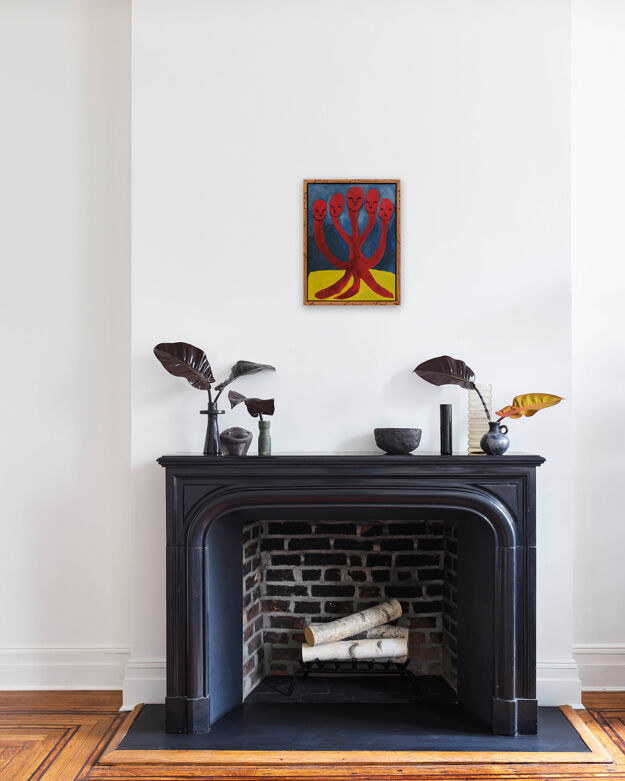EMMA KOLHMANN
SPOTLIGHT:
EMMA KOLHMANN
The artist on the importance of learning about subjects outside of art and realizing she's exactly where she's supposed to be.
You have a really distinct style, particularly when it comes to your renderings of human figures. How did that develop?
I think I was always really interested in working figuratively. When I was in college, I was really into reading theory. I went to a very liberal arts school that didn't have majors or grades, so it was like, "Study what you want." At school, I was really not into being an art major. I wanted to be more didactic and study all these things like political philosophy and post-colonial theory and things that I felt were important for me to know. And so when I was studying all this stuff, I was also always into art, and I felt like I wanted something to connect those two together, and I think my human figurative works spawned out of that. I was mostly trying not to pigeonhole myself focusing on gender and focusing on fluidity. I was really focused on dismantling, whatever that meant. And a lot of that work was very abstract, but more humanoid figures. It was a little bit more graphic. It was more grotesque.
How have those fields of study you mentioned – political theory and those sorts of things – come through your work?
Even though it wasn't art school, I think what I learned from that experience was feeling like I had to make meaning behind everything I made. I felt like I had to have a lineage of where this came from and why I was making it, and that really, I think, hurt my creative process in a way. I think just trying to find validation within academia was an important thing, even though I went to the most atypical college. Now, I'm informed by those things because I like reading, but I also like reading poetry and I like reading about other things that aren't necessarily as dense and heavy as political philosophy. But I do think it made me have more of a critical idea of what I like maybe, and also just who is going to view it. I want people to feel accepted by the work and not feel like it's not for them. It's for everyone. I want this inclusive feeling when you look at it.
Who are some of your favorite authors? What are some of your favorite texts?
I'm really into Cookie Mueller right now. I was on vacation and I brought this collection of short stories she wrote called Walking Through Clear Water in a Pool Painted Black. And it was so funny because she was in a bunch of John Waters' films. She's this very radical, cool lady and it was really amazing reading her stuff when I was in Italy because she talks about being in Sicily and talked about all these things that I would never have thought would have related to my trip, but totally did.
And I really love Anne Sexton's poetry. When I first started getting into poetry, I found her book in this pile of stuff my friend was getting rid of. I was going through a breakup at the time and I felt so connected to the feeling of being discarded because a bunch of her poems are about her husband cheating on her or just losing yourself in someone. I was painting primarily in watercolor and she had this one line that's like, "I'm watercolor, I wash away," or something and it really struck me. It felt so real to me at the time.
Painters, in particular, I've noticed, really seem to be drawn to poetry over other kinds of text. Do you feel like there's a relationship between poetry and your own work, or anything that you draw from it?
Yes. Before I was doing art as a career, I was making zines and writing. After college, I was making zines because I really wanted to keep a practice going. I was working service, so I needed another form of work that kept my brain going, I guess. I was making these short zines that were images and then text at the bottom – very sequential art. Every month, I would make them and send them out to all my friends or new acquaintances. That was something that really helped me connect to people, but also just put words to what I was making or drawing. I did it for about two or three years. I’ve slowed down making zines because I've just been working on shows, and I usually try to make zines with the show just to have that connection. I like making work that's affordable to people.
It's interesting you mentioned affordability. I feel like that's something that's, in one form or another, very much in discussion in art. Is that something you're always cognizant of as you're making work?
My sister and I have a press together called Mundus Press that we started last year. My sister is a writer and a curator and an artist as well. She's my younger sister, but she's my best friend. Making zines is how I came into my career. And it was always really important within the DIY scene, within the punk scene, to make these things that you can easily send to people or bring to shows. Some of the artists that I admire did that too, and I think that's really important. I think making things in unlimited editions and having stuff accessible to the most people is important. I've always been focused on that because, for myself, I never thought I would be doing this as a career to begin with. I think it's really important to have that function alongside whatever show that I'm doing. And that's why my sister and I finally started this press to make sure that it has a home and is also a home for other artists or other artists who wouldn't consider themselves artists.
What's your relationship with your sister like as a collaborator?
We're very different. I'm kind of a mess and she's very organized. She's always kept an archive of my work even when I wasn't doing as many shows. It's been part of her own practice to make archives for herself and our family archive. And when we work together, it's always really fun because she has a way of articulating stuff through words that I don't think I've ever been able to. It's always been hard for me to write even though I try.
We're doing a new project this month that she curated – it’s a show in the swamp behind our house. We live in Northampton, Massachusetts, and there's this famous Thomas Cole painting in The Met,The Oxbow, which depicts where we live. The event's only accessible by canoe, a lot of the work is sculptural. I'm making paintings on reclaimed crates that I've been collecting and don't want to throw away because it's just such an excess of material, and then there's like 30 artists from all over who are participating. And we're doing a book about the idea of this landscape as a show in a painting, but also trying to make it more for a wide audience for people who can't attend or who don't really know what this is.
Are there any habits you have as you work? Rituals or other things that you do as you're going about your practice?
I wake up really early and I need coffee, and my coffee time is really important [laughs]. That's my recharge button. I usually get to the studio pretty early and I work for large chunks of time, like for five hours straight. Sometimes I'll just work and then take a break, and if it's sunny out, I'll try to sit outside and be in the sun and take a walk. My rituals are kind of limited now because I used to have more of a schedule where I would go to a library and work or do some kind of brainstorming session, but instead, I have all my books here [in my studio] and if it's in the morning, I'll try to spend some time looking through books. I can't work in the night. I'm very much a day person unless I have bad insomnia, which is usually around the full moon. The moon dictates everything for me. That must sound crazy.
No! The last full moon, I was out of it and couldn't sleep. It was wild.
It's such an interesting thing. You could feel so far removed from everything – from the moon itself, from the solar system. But as soon as it becomes full, I have to go stay up all night or something.
What's your relationship with technology like?
I'm an analog person. I wish that I was better with technology. The way I use Photoshop sometimes to make T-shirts or to make other forms of ephemera, I'm so bad at it and my sister's really good. I will draw something out before I will use a tablet, or I'll listen to a tape before I listen to a thing on my computer like Spotify just because I like having tapes and having that package and putting it into something. Same with books. I wish I was a more technologically savvy person because I think there are great things that come from it, like connecting to people. I'm pretty good at social media. I love meeting people on the internet that way sometimes because I live in a pretty remote town. I go to New York a fair amount, but meeting someone who doesn't live on your coast, it’s always nice to connect that way.
You said you're not always the best with technology, but do you have any favorite websites or any internet rabbit holes you tend to fall down?
I love YouTube. I like watching things on YouTube that are from previous decades and watching old episodes of Antiques Roadshow or documentaries. There was also that internet time machine that you could go to and you can go back to 2001 and see what the internet looked like. I went to a middle school that was called The Computer School and we had to build websites about geology. Our geology project was building a website about the three different phases of metamorphic rocks. That's as far as I went with technology [laughs].
I love that. Are there any hobbies or other things outside of your art practice that you're passionate about?
I love lap swimming at the YMCA, and I love hiking and ice skating. This past winter, my sister and I got ice skates and we were ice skating “wild ice”, which is a term that they use for outdoor ice that's just, like, a pond.
I hadn't heard that term before!
I hadn't heard it either! And then our friends were really into it, and then we would go at 7:30 in the morning and ice skate. It was probably the most magical experience because I barely ice skated as a kid. I grew up in the Bronx. We went to Wollman Rink in Central Park maybe three times. Skating on wild ice – it's so clear and crisp and you can see straight to the bottom of the pond. It just felt like being in Little Women skating in snow except for the part with the ice breaking. I'm going to do it, I hope, for the rest of my life. I love it so much.
You really love all of these athletic outdoor pursuits and you're from the Bronx. Why did you make the move to a more rural place, and what do you feel it gives you in general, versus the city?
My parents always wanted me to move back to the city after I graduated college because the college I went to, Hampshire, is in Hadley, Massachusetts. But after college, I just stayed here because I felt a little overwhelmed by the idea of moving. After the recession, I felt like I basically didn't get a degree. I just didn't know what it was worth. I had no idea what I could do. I could work at a bakery and live here and have this small-town life for a certain amount of time and then I guessed I'd go to grad school, but I never did that.
It's so beautiful here. It's a small town, but also very liberal, has tons of farms, tons of people making cool stuff. I just ended up here and stayed. And it's not that far from the city. But I was uncertain and like, "Am I wasting my life here? What am I doing?" And then I just made connections through the zine world, through showing up to things that I felt were important to me, making friends and lasting bonds through the internet. I would reach out and be like, "I like making art, and I like your work. Can we be friends?" That actually really worked for me, and I was able to stay here and build my practice and afford my life. I was lucky to have a job that let me come and go after I traveled somewhere or did a show or went on tour with a punk band or something. It really benefited me because I had the time to spread out, have a studio, understand what a studio practice even is.
It seems you've got a really strong sense of community where you're at now.
Yes, I wanted to make a community. Even when I was reaching out through the internet, it was about making community. It's been eight or 10 years now that I've just been making these connections with people who make art or who make music or do creative things. It's not just about building your resume. And that's why I've always thought maybe I never grew up or something because I hate networking and I hate that shallow, "What do you do?" mentality. Whenever people used to ask me that when I was still working at the bakery, I'd just be like, "I'm a cashier. I don't want to talk about what I actually do."
I know exactly what you mean.
It's painful to talk about.
What are some things, if any, that you collect?
I collect books. It's not about the title per se, it's usually just whether or not I'm drawn to the work and I have a pretty extensive naive painting library that I love. I am always more drawn to outsider artists and folk art just because I feel like there's something really natural and real about it, and poetry as well. And I also collect rocks that I find. I was not intentionally hoarding them, but I just have a collection of rocks that I've collected through my travels. And I have a squished penny collection. That’s also something I didn't realize I collected, but when I moved studios, I was like, "Oh my God, I have so many of these from all over."
I actually haven't even thought about those kinds of pennies in so long. What a fun reminder. This next question could be very existential or not depending on however you interpret it: Is there anything you'd want to start over?
No. I'm glad that I'm doing what I'm doing. If I started over, I think it would be very different. For a long time, I thought I was doing everything wrong. I was like, “I don't know enough, I don't have enough knowledge to be doing the things that I'm doing,” or doubting my ability, and I think I talked myself out of a lot of those things. I'm really happy that I'm here and I stayed here. I think it would have been really different if I just decided to move to a big city and be someone else. My inability to make decisions, I think, was a good thing in the long run. For a while I didn't think so.
You mentioned you felt like you were doing everything wrong before. When did that mindset change?
When I started to afford my life or the life of an artist, I felt like, “I can do this.” But I think why I thought I was doing things wrong was that I went to a liberal arts school. I didn't go to art school. I don't have the same credentials as some other artists do who are established, and I felt like that was maybe one of the things that I needed to do, and I don't necessarily think you do.
I think it could be important, but I also think it's important to learn about history and learn about things that aren't just about art, and I'm glad that I did that. I really think it's important to learn about how the world works and why this place is so fucked up and why there are so many questions, especially that are relevant to the current moment involving post-colonial history or feminism or intersectionality or all these things that have infiltrated our consciousness even more. And I think that's why I'm glad that I stuck with these existential questions like, “Why are things the way they are and why am I here?”
